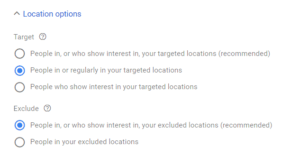‘Twas the night before Christmas and all through the net,
Not an event was occurring, not even on the dark web.
The Google Ads were hung by the SERP with care,
In hopes that conversions soon would be there.
The Google Ads Experts were nestled, all snug in their beds.
While visions of higher quality scores danced in their heads.
We had just settled our brains for a long winter’s nap.
While automation rules rolled out new bidding caps.
When out on the ‘net there arose such a clatter
I sprang to my Surface to see what was the matter.
With coffee in my hand and my keyboard at the ready.
I gazed afar and held myself steady.
And, what to my wondering eyes should appear?
But, Saint Google and eight Google Ad Engineers.
The Engineers sprang to their desk and opened their code,
Exposing the luster of embedded objects below.
The code flew with such fury that smoke arose from the editor.
As new features flowed from alpha to beta and they were so much better.
We watched in wonder as new features appeared.
Improving performance, in my head, I cheered.
Saint Google sprang to the sleigh and to his team gave a whistle.
And Engineers flew towards the sleigh like heat-seeking missiles.
Taking their seats with masks on and excitement anew.
They logged in and flew back to Mountain View.
I heard them exclaim, ere they drove out of sight—
“Merry Googling to all, and to all a Google night.”
…………………………………………………………………………………..
Our Wish List

-
Negative Search Term Tab
Ruth Porat, Alphabet’s CFO, needs to read this one because Google is leaving billions on the table. We have been 
-
Second Round Of COVID-19 Ad Credits
With the extra revenue that would inevitably come from the Negative Search Term Tab, there is a lot of goodwill and cheer Google can spread to their advertisers. Earlier this year, Google provided $340 million worth of ad credits to advertisers as part of their commitment to “support SMBs, health organizations and governments, and health workers on the frontline of this global pandemic”. Even with the earlier stimulus and relief initiatives such as these ad credits, the reality is that many businesses are still feeling the impact of the disruptions caused by COVID-19. Another ad credit from Saint Google would do a lot to raise goodwill and cheer.
-
Human Expert Data & Functions
Google is trying to take the industry down the path to ML (Machine Learning) nirvana. As they do this, they are taking away the tools and data that Human Experts need. However, ML is not Nirvana, and to play fair they should give human experts access to the same data and functions as they are opening to their code. To get started on this, they could give us back things they took in the name of ML: variant matching control, placement controls, SERP data, to name a few.
-
Opt-Out Abilities In The Name Of Human Control
Even if the Machine Learning features such as Variant Matching Control and Reduced Search Queries shown are part of the system going forward, our wishlist is the ability to opt-out of these settings. For example, we would love the ability to opt-out of close variant matching. Also, with Google restricting the search queries seen for searches where there is no “significant” data we would love to have the ability to opt-out of bidding for searches that Google deems to fall outside the scope of these significant data thresholds.
-
Responsive Keywords
Many keywords follow a typical pattern resulting in lots of keywords which makes managing the account difficult. The idea here is that you create a master keyword and use lists to iterate the keyword. An example would look like this:
Plumber *1City *2Qualifier
The asterisk indicates a list, the number indicates the order of iteration, and the text is the list’s name. If a plumber had this keyword with 10 cities in the city list and four service qualifiers in the qualifier list, this would replace 40 keywords. A Qualifier list for a plumber might be things like an emergency, 24/7, Open Saturday, Open Now. Ruth are you listening…we said Billions and here is the second one.
-
SERP Data Bidding
Different clients embrace different strategies for Google Ads and the SERP (Search Engine Results Page). Some do not want an ad running on a page that they already have a first organic position on, but others do. Some want to be more aggressive when specific other sites populate the page. This would give us the ability to target this and to modify bidding based on the SEO position. We would like to specify the website, location range, and bid modifier.
-
Daily Budget Controls
Budgets have rules that not everyone understands, and sometimes it makes it difficult to control the account properly. If you get behind on the daily budget, Google Ads will attempt to catch you up by increasing the budget by up to 20%. It does this by multiplying the daily budget by the number of days in the month. This new budget is compared to the current monthly spend. The new budget is always in Google’s best interest but not always in yours. We want the budget to be the budget and sometimes we want the catch-up. This needs to have a control for the catch-up percent allowed.
-
Grade the GDN
The GDN (Google Display Network) is massive and poorly documented. Create grades of A, B, C. A is the top 5%, B is the next 15%, and C is the unwashed masses. Sites should be allowed to file for an A or B ranking, and if they get it, they are rewarded with more revenue. This review should cost money to apply for and include a review of performance.
-
Make It Easier To Opt-Out of Mobile App Placement In GDN
Google loves targeting ads on mobile apps because it enriches Google. However, we do not like this placement most of the time. Especially with the growth of advertisements on kids’ apps and games, we suspect many of the clicks on these ads aren’t people with a legitimate interest in your product, many of these we suspect are small children accidentally clicking on these ads trying to get back to their game. For example, if you are building brand awareness for Beer, you do not want your ads showing up on an App frequented by children.
While Google still gives us the ability to opt-out of ads on apps, they have moved this around and made it much more complicated over the years. We would love the ability to opt-out of app ads with the click of a button.
Regifting from the Grinch
The Grinch section is for things that were taken from us that we would like back. The Grinch is an evil, sneaky, and despicable soul that takes control away from us, leaving the human experts handicapped by her user-friendly ways. The Grinch does this in the name of machine learning or privacy, but that does not make the deed any less dastardly. We had it before, and we want it back!
-
Search Query Data
This year, Google took away another layer of data from the search query data tab, and with it went a degree of control. Not only would we like this returned, but we also want 100% of the data, which we have never had.
-
Accelerated Delivery
Accelerated Delivery was put out to pasture or executed depending on the metaphor you like. Either way, it’s gone, and we would like it back. We can see how this change benefits Google by managing the spending rate, but we don’t care. Many of our clients, including us, believe that you should take the traffic when you can get it within a business day. Spreading it out over the day runs the risk of not spending the budget and lowering the total traffic. Google thinks there will be more traffic later, and you pay for it if they are wrong.
-
Keyword Matching Control
We are old school Google Ads Experts. We LOVE control, and we study our client’s needs much more in-depth than Google ever thought of. We understand the
-
Average Position
Google retired this somewhat flawed data point this year, and we hate to see an old friend go. We fully understand the flaws in this data, but it is a useful tool. We know that the new data that replaces it is more accurate, but it is so complicated, and explaining it to the client managers we report to is very difficult.
-
Target Position
Target position was a control that allowed us to buy only the impressions in which our position was somewhere we wanted. For clients that want to appear only at the top, this was a way to solve that. If the bid qualified for the top position, then it appeared, but never in the lower positions.
-
Placement Controls

So let’s wrap it up and put a bow on it
We know we are asking for a lot but we are not expecting everything, although that would be great. If there is a Googler that needs a purpose for their 20% time, feel free to adopt one of ours. Call us, and we will be glad to add more detail to any of these ideas.




